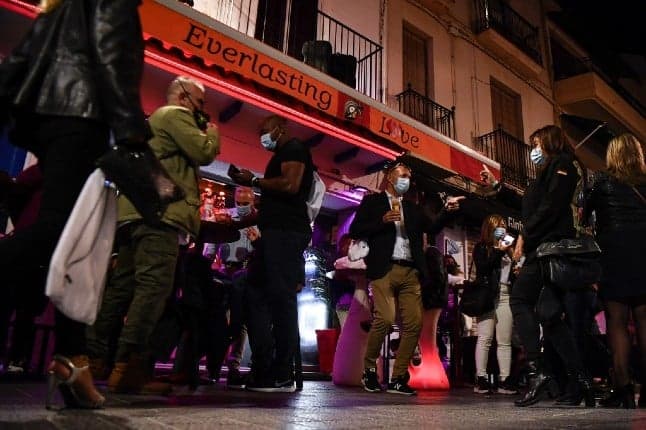Spanish town parties like it's 2019... and it's all in the name of science

Clinical studies never looked so good: for a few hours on Thursday in a beach town near Barcelona some 400 people said adios to pandemic distancing and partied like it was 2019 -- all in the name of science.
Masks were the only visible sign of the times as participants were given free reign to bar hop, dance and drink indoors and outdoors at cafes and clubs along a 400 metre stretch of street in the town of Sitges.
The aim of the study: to test whether clubs can reopen without posing a threat of contagion.
Besides agreeing to wear either FFP2 or surgical masks, revellers were required to present a negative antigen test taken a few hours prior to the
study.
"When I saw there was finally the chance to go and party I didn't think twice," happy participant Nuria Miralpeix, 38, told AFPTV. "The last time I went out was in March 2020. Since then I've been shut in and now I feel like a student who's dying to party on a Thursday!" added the financial director, smiling.
Though the feeling of freedom only lasts a few hours, Edgar, 37, said one must "take advantage."
The street in Sitges hosting the study is known historically for its nightlife. Parties here provided a safe space for homosexuals when they were persecuted under the Franco dictatorship from 1939 until 1975.
Organisers requested that participants respect social distancing for five days after the study to eliminate the risk of contamination.
Then another antigen test will reveal whether the party was responsible for any new cases. Clubs and bars in Catalonia were barely able to open for one month between last spring's confinements and new measures imposed in July.
"This clinical study should open the way for the return of nightlife -- the only sector that remains completely shut down," regional health official Marc
Armengol said.
Sponsored by the city and Catalonian health officials, the experiment follows two other studies conducted during concerts in Barcelona.
In December a team of researchers carried out a pilot project that brought together 500 previously-tested revellers who were able to dance without social distancing -- but with masks.
Days later, none of the participants had contracted Covid-19. At the end of March another test concert brought together some 5,000 people with organisers saying there was "no sign" of contagion afterwards.
Comments
See Also
Masks were the only visible sign of the times as participants were given free reign to bar hop, dance and drink indoors and outdoors at cafes and clubs along a 400 metre stretch of street in the town of Sitges.
The aim of the study: to test whether clubs can reopen without posing a threat of contagion.
Besides agreeing to wear either FFP2 or surgical masks, revellers were required to present a negative antigen test taken a few hours prior to the
study.
"When I saw there was finally the chance to go and party I didn't think twice," happy participant Nuria Miralpeix, 38, told AFPTV. "The last time I went out was in March 2020. Since then I've been shut in and now I feel like a student who's dying to party on a Thursday!" added the financial director, smiling.
Though the feeling of freedom only lasts a few hours, Edgar, 37, said one must "take advantage."
The street in Sitges hosting the study is known historically for its nightlife. Parties here provided a safe space for homosexuals when they were persecuted under the Franco dictatorship from 1939 until 1975.
Organisers requested that participants respect social distancing for five days after the study to eliminate the risk of contamination.
Then another antigen test will reveal whether the party was responsible for any new cases. Clubs and bars in Catalonia were barely able to open for one month between last spring's confinements and new measures imposed in July.
"This clinical study should open the way for the return of nightlife -- the only sector that remains completely shut down," regional health official Marc
Armengol said.
Sponsored by the city and Catalonian health officials, the experiment follows two other studies conducted during concerts in Barcelona.
In December a team of researchers carried out a pilot project that brought together 500 previously-tested revellers who were able to dance without social distancing -- but with masks.
Days later, none of the participants had contracted Covid-19. At the end of March another test concert brought together some 5,000 people with organisers saying there was "no sign" of contagion afterwards.
Join the conversation in our comments section below. Share your own views and experience and if you have a question or suggestion for our journalists then email us at [email protected].
Please keep comments civil, constructive and on topic – and make sure to read our terms of use before getting involved.
Please log in here to leave a comment.